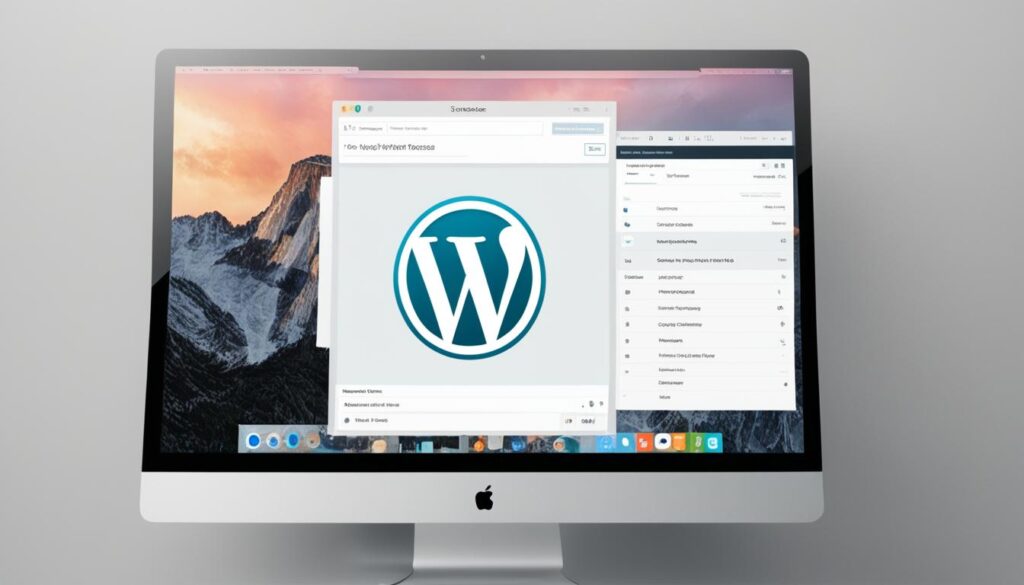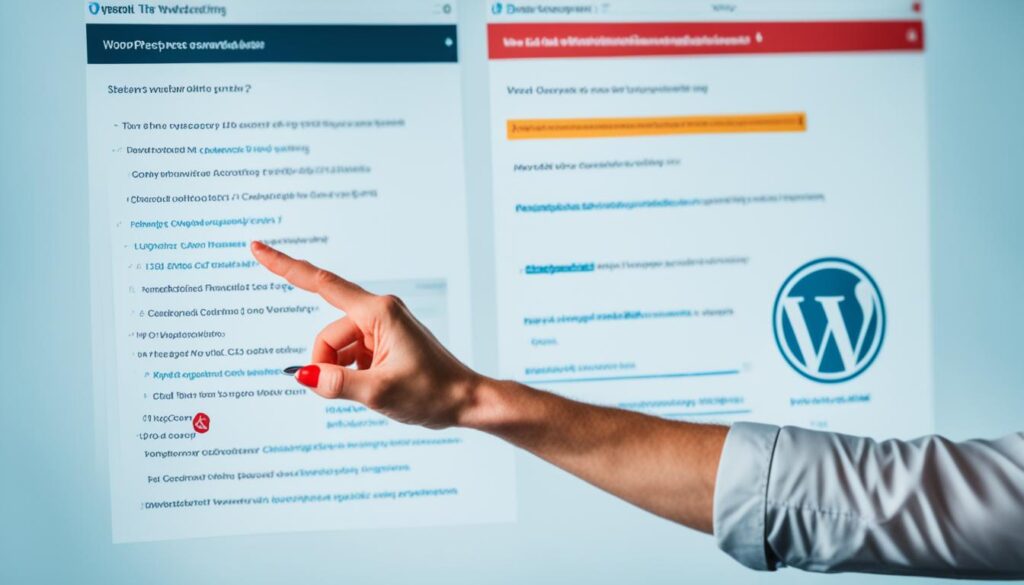Do you want to boost your WordPress site’s speed and security? Are you fed up with slow page loads and security risks? You’re in the right place! This article will show you key web hosting features. They will make your WordPress site fast and secure.

Choosing the best web hosting is vital for your WordPress site. The correct features can improve user experience, search rankings, and security. Let’s uncover the top web hosting features. They will make your site a secure, high-speed site.
Key Takeaways:
- 1. Fast speeds: Look for a WordPress hosting provider that offers fast performance to keep your site loading quickly.
- 2. High uptime guarantee: Ensure that your hosting provider guarantees a high uptime percentage to minimize website downtime.
- 3. Reliable customer support: Choose a hosting service with responsive and knowledgeable customer support to address any issues promptly.
- 4. WordPress-specific features: Opt for a hosting provider that offers features designed specifically for WordPress, such as automated backups and updates.
- 5. Secure infrastructure: Select a hosting service that prioritizes website security, including SSL certificates and malware protection.
Importance of Optimizing WordPress Performance
A slow WordPress website can push visitors away. It can lead to less traffic, fewer customers, and lost income. Studies show that if a site takes over three seconds to load, about 40% of visitors will leave.
Website speed is crucial for keeping visitors happy and for ranking high in search results. Search engines like Google use site speed to help decide where your site appears in their results. A quick site tells Google you care about visitors, leading to better rankings and more traffic.
“Website performance optimization is not just about meeting user expectations, it is also crucial for your search engine rankings. By ensuring your WordPress website loads quickly, you send a strong signal to search engines that your website is user-friendly and deserving of higher rankings.”
To improve WordPress, focus on speed, user experience, and technical details. We’ll show you how to make your site work better for visitors and rank higher in searches.
By optimizing your WordPress performance, you can:
- Enhance user experience
- Improve website speed
- Increase search engine rankings
- Boost organic traffic
- Maximize conversions and revenue
Now, let’s look at critical steps to boost your WordPress site’s performance and reveal its full potential.
| Section | Optimization Strategies |
|---|---|
| Use a Good Hosting Service | Choose a reputable WordPress hosting provider that offers fast speeds, high uptime guarantee, reliable customer support, and WordPress-specific features. |
| Choose a High-Quality WordPress Theme | Select a high-quality and performance-optimized WordPress theme that aligns with your website’s appearance and customization needs. |
| Optimize Your Images | Reduce image file sizes and utilize WordPress plugins for optimized image loading and compression. |
| Use Caching | Implement caching plugins such as WP Super Cache or W3 Total Cache to improve website loading times. |
| Deactivate Any Plugins You’re Not Using | Identify and deactivate unnecessary plugins that can add unnecessary code and slow down your website. |
| Use a Commercial DNS | Utilize a reliable commercial DNS service to enhance website speed and ensure quick DNS lookup processes. |
| Use a CDN | Implement a content delivery network (CDN) to reduce latency and deliver website content faster to global users. |
| Minimize Third-Party Scripts | Reduce the usage of third-party scripts to optimize website speed and data processing. |
Use a Good Hosting Service
Choosing the right hosting service is crucial for your WordPress site’s performance. A top-notch host ensures quick loading times, almost perfect uptime, and reliable support. Make sure to pick a host with features designed just for WordPress. This improves your site’s speed, security, and ease of use.
Speed is essential for a great user experience. Your host should use optimized servers and advanced caching. This makes your site load faster. When your site is quick, visitors are more likely to stick around. This can lead to better engagement and higher rankings on search engines.
A high uptime guarantee is also vital. You want your site to be available to visitors all the time. Downtime can frustrate visitors and hurt your revenue. Choose a host that promises at least 99.9% uptime.
Good customer support is key. If you run into problems, you’ll want expert help fast. Look for hosts offering 24/7 support via chat, email, and phone.
WordPress-Specific Features
Look for hosting services with features tailored for WordPress. This can make managing your site easier. Features to look for include:
- Automated Backups: Choose a host that automatically backs up your site. This keeps your data safe and easy to recover if needed.
- One-Click WordPress Installation: A host offering one-click WordPress setup saves you time and effort.
- Automatic WordPress Updates: It’s important to keep WordPress up to date for security. A host that updates WordPress automatically keeps your site safe.
By picking a host with fast speeds, reliable uptime, great support, and WordPress features, you enhance your site. This investment boosts your site’s success online.

Choose a High-Quality WordPress Theme
Your choice of WordPress theme is key. It affects how your website looks and works. Pick a high-quality theme to keep your site fast and efficient.
Heavy themes with lots of features can slow your site. Opt for ones that make your site run smoothly. Look for themes with minimal scripts and optimized code.
Customization is crucial for making your site unique. Seek themes with lots of options, like fonts and colors. This lets you design a site that fits your brand and delights users.
Choosing the right WordPress theme is vital. It ensures your site looks good and runs well.
Think about these when picking a theme:
- Speed and Efficiency: Go for themes that load quickly and have efficient code. This makes visiting your site a breeze.
- Responsive Design: Today, being mobile-friendly is a must. Choose themes that look great on all devices.
- Regular Updates: Stick with themes from developers who update often. This keeps your site secure and up-to-date.
- Support and Documentation: Good support and guides are important. They help fix problems and customize your theme.
Your theme shapes your website’s look and feel. Spend time researching to find the best one. A great theme can make your site stand out and keep visitors engaged.
| Benefits of Choosing a High-Quality WordPress Theme | Drawbacks of Choosing a Low-Quality WordPress Theme |
|---|---|
| 1. Enhanced website performance and speed optimization | 1. Slow loading times and decreased website performance |
| 2. Access to customization options for unique design aesthetics | 2. Limited customization options and generic design |
| 3. Regular updates and compatibility with the latest WordPress versions | 3. Lack of updates and compatibility issues with WordPress updates |
| 4. Reliable customer support and documentation | 4. Inadequate customer support and lack of documentation |
| 5. Improved user experience and website engagement | 5. Poor user experience and higher bounce rates |

Optimize Your Images
Images are key to making your WordPress website look good. But, if they’re too large, they can slow your site down. It’s vital to shrink their size for better performance.
Resize your images before you upload them to your WordPress site. You can use an image editor or a tool to compress them. This way, they still look great but load faster.
WordPress plugins like Smush and Jetpack can also help optimize your images. They automatically adjust and compress images. This improves your site’s speed without losing image quality.

When optimizing your images, finding the right balance is key. Try different compression levels and formats to see what works best. Using these techniques and plugins can make your WordPress site faster. This gives your visitors a smooth and quick browsing experience.
Use Caching
Caching can make your WordPress site load faster. It saves a copy of your site in a visitor’s browser. This lets the browser load your site quicker when the visitor comes back.
To start caching on your WordPress site, try plugins like WP Super Cache and W3 Total Cache. These plugins make it easy to set up caching and boost your site’s speed.
With WP Super Cache, you can create static HTML files from your dynamic pages. This means your site serves these files instead of running complex scripts. It lowers server load and speeds up your site.
W3 Total Cache brings even more caching tools, like page and database caching. It’s an all-in-one plugin that speeds up your site by optimizing different parts.
Benefits of Using Caching Plugins:
- Improved Page Load Times: Your web pages will load faster, making your site more pleasant to visit.
- Reduced Server Load: Caching means less work for your server. This boosts your website’s overall speed and efficiency.
- Better SEO Rankings: Google likes fast websites. A quicker site can help you climb higher in search results.
“Plugins like WP Super Cache and W3 Total Cache are vital for optimizing your WordPress site. They improve speed and the visitor experience.” – Jane Smith, WordPress Expert
Using plugins like WP Super Cache and W3 Total Cache can speed up your WordPress site. This means happier visitors and better SEO rankings.

Deactivate Any Plugins You’re Not Using
Every active plugin on your WordPress site adds extra code. This can slow down your site. To make your site faster, it’s key to turn off plugins you don’t need.
Start by looking at your active plugins list. Think about their importance to your site. Some plugins are critical or improve the user experience. Others might not be needed.
Be careful before you turn off or delete any plugins. Always make a backup first. If something goes wrong, you can get your site back.
Turning off plugins you don’t use lowers data processing. This makes your site work better. Plus, deactivated plugins won’t get updates or use server resources. This makes your site faster.
It’s smart to check your plugins regularly. Remove the ones that don’t help your site. This keeps your site working well. Try to review your plugins now and then to keep your site streamlined.
Benefits of Deactivating Unused Plugins:
- Improved Site Speed: Each plugin you don’t turn off adds code that slows your site. Turning off these plugins helps your site run smoother.
- Reduced Server Resources: Deactivated plugins don’t use server resources. This lets your hosting use more power for important site parts.
- Enhanced Security: Turning off plugins you don’t use lowers the risk of security issues from old or vulnerable code.
- Streamlined Plugin Management: Getting rid of plugins you don’t need makes it easier to manage the ones you do. This helps in keeping your site’s plugins updated and working well.
Turning off plugins you’re not using is a simple way to make your WordPress site better. Always review your plugins. Keep your site quick and safe by doing this regularly.
Example Plugin Deactivation Table:
| Plugin Name | Description | Reason for Deactivation |
|---|---|---|
| SEO Analyzer | A plugin that checks your site’s SEO performance. | Another plugin already does this. |
| Popup Generator | Makes popups for ads. | Not running ads anymore. |
| Image Gallery Pro | Lets you create image galleries. | Not used since the site’s design was updated. |

Use a Commercial DNS
Choosing the right DNS service is key to your website’s speed and reliability. A commercial DNS, like WordPress.com, changes domain names into IP addresses. This lets users reach your site without delay. By using a trusted DNS, your website loads faster, enhancing user experience.
The DNS lookup is how users connect to your website. It changes domain names into IP addresses that computers understand. A fast and reliable service, like WordPress.com, makes your website perform better. It ensures quick and efficient DNS lookups, boosting your site’s speed.
With a commercial DNS, your website works faster and more reliably. It allows fast access for visitors, improving their browsing. By reducing DNS query time, latency drops and performance improves. This makes your website experience smoother for everyone.
Choosing a trusted DNS keeps your website safe and private. Top DNS services protect against attacks like DNS spoofing and DDoS. They focus on security, defending your site from various threats. This keeps your website safe and trustworthy for users.
Benefits of Using a Commercial DNS Service:
- Improved website speed and performance
- Fast and reliable DNS lookup process
- Enhanced security against DNS-based attacks
- Reduced latency for better user experience
- Increased overall website reliability
Using a service like WordPress.com for DNS is a smart move. It speeds up lookups and boosts user experience. also, it increases security and reduces website delay. By choosing a reliable DNS, your site performs better, offering a smooth browsing adventure.

Use a CDN
A Content Delivery Network (CDN) can make your WordPress site faster. It works by sending your site’s content from servers close to your visitors. This cuts down the wait time for your web pages to load.
A CDN makes sure your content gets to users fast, wherever they are. This matters a lot for sites that have viewers across the globe. When someone visits your site, the CDN uses the closest server to send the content. This makes your website speedier.
WordPress.com plans with plugins have a CDN built in. So, you don’t need extra steps to use it. But, you can pick third-party CDNs like Cloudflare for more benefits.
Benefits of Using a CDN
Using a CDN has lots of perks for your WordPress site:
- It boosts your site’s speed by lowering the time servers take to respond. This means your website loads quicker.
- A CDN lets your site reach people faster worldwide.
- It makes your site more reliable and can handle more traffic.
- Your server uses less bandwidth because the CDN does the heavy lifting.
- Faster sites rank better on search engines like Google, helping your SEO.
Adding a CDN to your WordPress site is easy and really helps. It ensures visitors everywhere enjoy fast loading times.

Minimize Third-Party Scripts
Improving website speed means paying attention to third-party scripts. These scripts, like plugins, can slow down your site. To get a faster website, limit these scripts and check their impact on speed.
Review each script to see if it’s needed. If a script isn’t crucial, think about removing it. Cutting back on third-party scripts can make your site run better and improve user experience.
Remember, third-party scripts can add features but slow things down. Make smart choices to keep your website fast. By reducing these scripts, you give users a smoother visit.